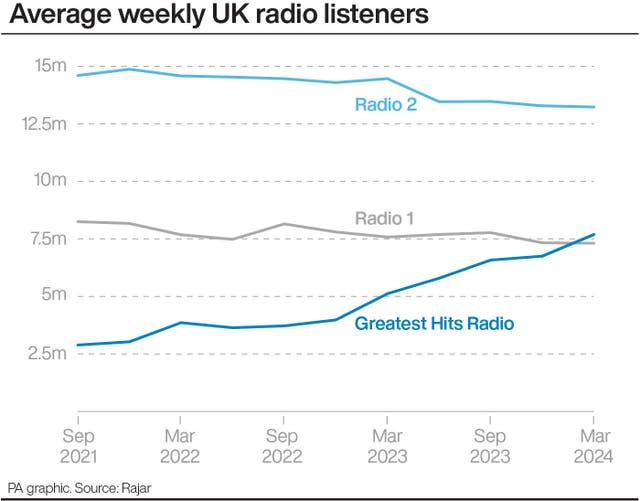Greatest Hits Radio overtakes BBC Radio 1 in listening figures

Commercial music station Greatest Hits Radio has enjoyed another surge in listeners and now has a larger audience than BBC Radio 1, figures show.
The station, which is home to several former BBC DJs including Ken Bruce and Simon Mayo, had an average weekly audience of 7.69 million across January to March of this year.
This is up 14% or nearly a million from 6.75 million in the previous three months, and a jump of 50% from 5.12 million a year earlier.

The success of Greatest Hits Radio has been driven by flagship signings such as Ken Bruce, who joined the station from BBC Radio 2 in April 2023, bringing with him the much-loved Popmaster quiz.
Former Radio 2 drivetime host Simon Mayo has presented the same slot on Greatest Hits Radio since March 2021.
The station features other broadcasters who once had long-running shows on BBC radio, including Paul Gambaccini, Jackie Brambles, Alex Lester and Richard Allinson.

Its weekly audience of 7.69 million in January to March of this year was large enough to outrank BBC Radio 1 for the first time, which had 7.31 million listeners across the same period, according to data published by the research body Rajar.
Greatest Hits Radio targets a different audience from Radio 1, concentrating on music from the 1970s, 1980s and 1990 rather than contemporary pop and dance.
But the crossover reflects how the UK’s listening habits have changed rapidly in recent years, accompanied by major changes within the radio industry.
BBC Radio 2 continues to have a healthy lead over all other music stations, with an average weekly audience of 13.23 million people in the latest quarter, broadly unchanged on the previous three months.
The station shed a million listeners in the immediate aftermath of Ken Bruce’s departure in spring 2023, but this decline has not continued and its figures look to have levelled off.
Radio 1 is also holding steady, with its latest figure of 7.31 million down only slightly from 7.33 million in the previous quarter.
But listeners to the BBC’s local and regional stations have continued to fall, with a total average audience of 6.85 million in January to March 2024, down from 6.99 million in the previous quarter and 7.38 million a year earlier.
The fall has come as the corporation has sought to make savings in the face of high inflation and a licence fee freeze, including plans for local stations to share more content and transmit fewer programmes unique to their areas.
In July-September 2021, the first quarter since Rajar resumed reporting after the Covid-19 pandemic, the BBC’s local and regional audience stood at 9.16 million.

 Yahoo News
Yahoo News 
